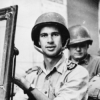John Hersey

John Hersey
John Richard Herseywas a Pulitzer Prize-winning American writer and journalist considered one of the earliest practitioners of the so-called New Journalism, in which storytelling techniques of fiction are adapted to non-fiction reportage. Hersey's account of the aftermath of the atomic bomb dropped on Hiroshima, Japan, was adjudged the finest piece of American journalism of the 20th century by a 36-member panel associated with New York University's journalism department...
NationalityAmerican
ProfessionWriter
Date of Birth17 June 1914
CountryUnited States of America
Many people who did not die right away came down with nausea, headache, diarrhea, malaise, and fever, which lasted several days. Doctors could not be certain whether some of these symptoms were the result of radiation or nervous shock.
Not a particular country, not a particular city, and not a particular people.
Do not work primarily for money; do your duty to patients first and let the money follow; our life is short, we don't live twice; the whirlwind will pick up the leaves and spin them, but then it will drop them and they will form a pile.
It's a failure of national vision when you regard children as weapons, and talents as materials you can mine, assay, and fabricate for profit and defense.
At exactly fifteen minutes past eight in the morning, on August 6, 1945, Japanese time, at the moment when the atomic bomb flashed above Hiroshima, Miss Toshiko Sasaki, a clerk in the personnel department of the East Asia Tin Works, had just sat down at her place in the plant office and was turning her head to speak to the girl at the next desk.
The second stage set in ten or fifteen days after the bombing. Its first symptom was falling hair. Diarrhea and fever, which in some cases went as high as 106, came next.
My two major faults are that I row too long and pick up too many women
The third stage was the reaction that came when the body struggled to compensate for its ills - when, for instance, the white count not only returned to normal but increased to much higher than normal levels.
When the writing is really working, I think there is something like dreaming going on. I don't know how to draw the line between the conscious management of what you're doing and this state. . . . I would say that it's related to daydreaming. When I feel really engaged with a passage, I become so lost in it that I'm unaware of my real surroundings, totally involved in the pictures and sounds that that passage evokes.
I thought of God as being able to talk big and write *very* small.
To my great surprise, I never heard anyone cry out in the disorder, even though they suffered in great agony. They died in silence, with no grudge, setting their teeth to bear it. All for the country!
To be a writer is to throw away a great deal, not to be satisfied, to type again, and then again and once more, and over and over.
What has kept the world safe from the bomb since 1945 has not been deterrence, in the sense of fear of specific weapons, so much as it's been memory. The memory of what happened at Hiroshima.
There, in the tin factory, in the first moment of the atomic age, a human being was crushed by books.